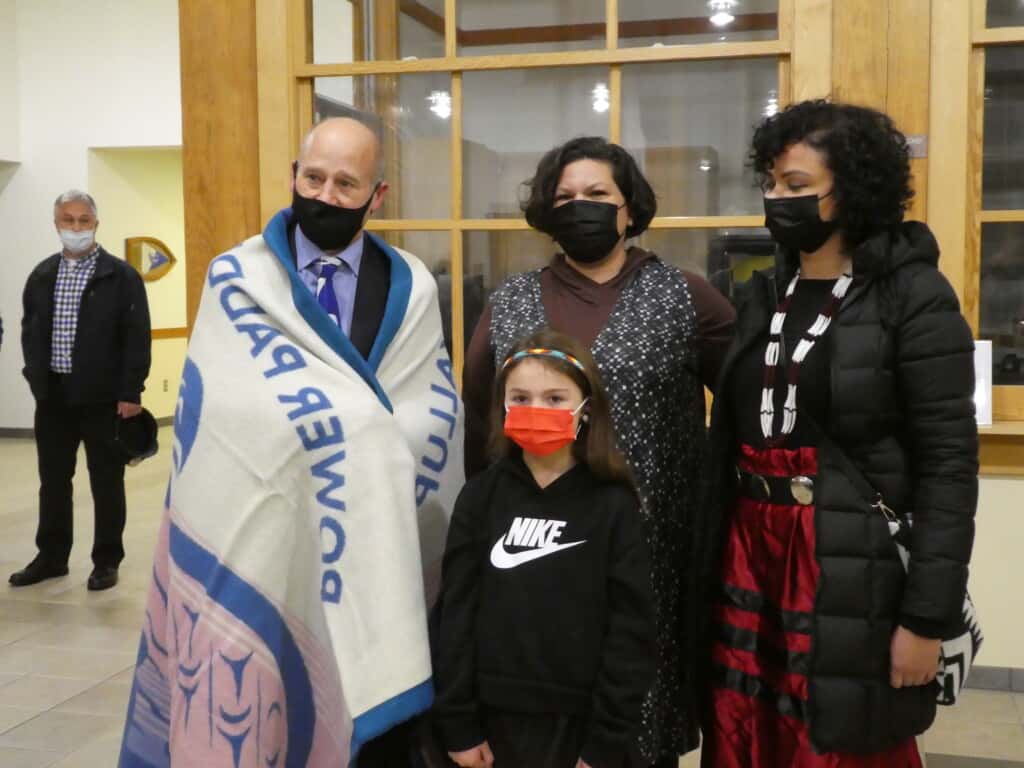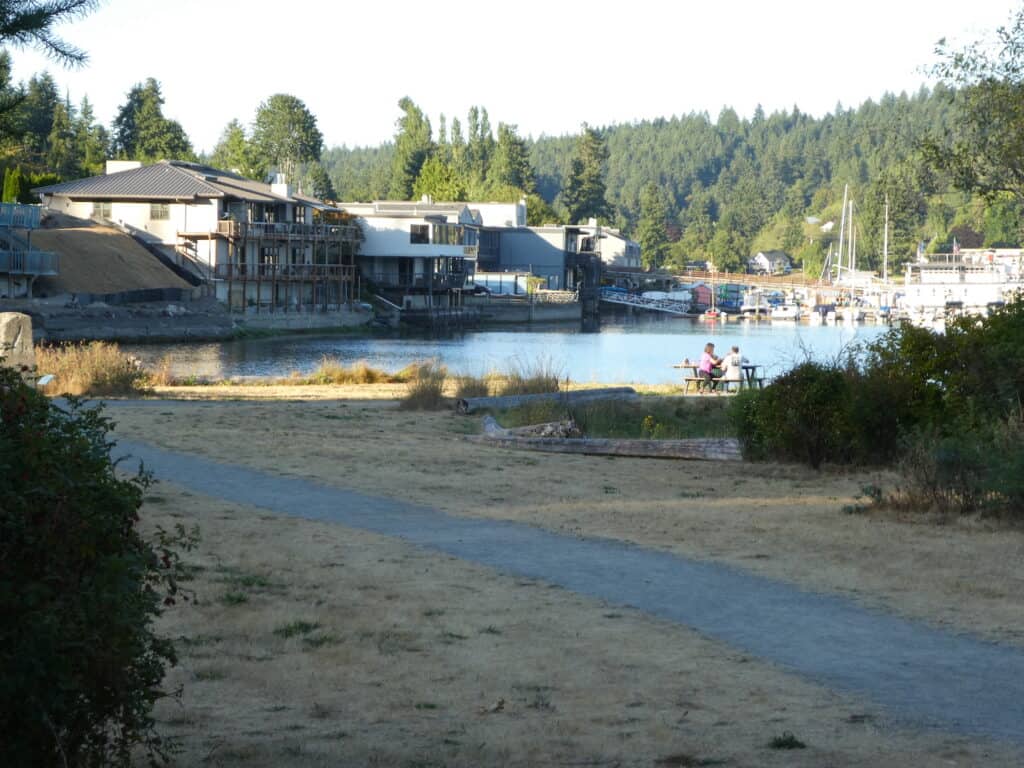Government
Mayor Kuhn, City Council celebrate accomplishments as chapter comes to close
The past four years have seen remarkable changes to Gig Harbor under the leadership of outgoing Mayor Kit Kuhn and the City Council.
At Monday’s Council meeting, the mayor reviewed some of the accomplishments that support the city’s vision statement of sustainable growth that protects the natural and historic resources while preserving the values, quality of life and culture of the city.
In one of its first acts in 2019, the Council passed a residential moratorium to control growth after Gig Harbor was identified as the fastest-growing city in the state two years earlier. Of special significance was the prohibition of development agreements that for many years had deviated from city codes. The moratorium saved a 15-acre stand of trees near the downtown waterfront from being clear-cut and replaced with a gated community of 10 large homes. Subsequently, the land was purchased by the city and is now Soundview Forest.

Mayor Kit Kuhn wrapped in the blanket presented to him by Puyallup Tribal Councilmember Anna Bean, Tribal Language Program Director Amber Hayward and 6-year-old Tribal member Zoe Keating. Charlee Glock-Jackson / Gig Harbor Now
The city worked with Peninsula School District to pass a bond to build two new schools and replace two others, and then fast-tracked the permitting process.
“This saved the district enough money that they are able to rebuild Kopachuck and Key Peninsula middle schools with the money saved,” Kuhn said.
Gig Harbor worked with other Pierce County mayors to establish the South Sound Housing Affordability Partners group to help create more affordable housing.
After considerable public input, the city’s fireworks regulations were updated, and, starting in 2022, fireworks will be allowed only on July 4.
The city declined to participate in a consideration by Puget Sound Regional Council and Pierce County Regional Council to bring a ferry terminal to the harbor.
“When I learned that Gig Harbor would have to pay for everything, I asked them, ‘Why aren’t you working on Highway 16 instead?’” Kuhn said. “Our taxpayers would have had to pay for a whole new ferry and a whole new terminal, so we told the PSRC that we declined.”
The administration and Council also declined interest in expanding the Tacoma Narrows Airport into a regional commercial airport, and when the school district purchased the Boys and Girls Club and displaced the Senior Center, the city negotiated $100,000 from the school district – which the city matched – to help the seniors find a new home.
The East Bay area was removed from the city’s urban growth area (UGA), thus preserving open space.
Ancich Waterfront Park was built and the historic net shed was restored for eventual use by the commercial fishermen. A new dock is being built at the park for launching human-powered watercraft.
The sports complex was begun and a memorandum of understanding and interlocal agreement created with the YMCA for development of two turf fields by 2024. In future years, the city will develop Phase 1B with bocce ball and pickleball courts, two playgrounds, picnic areas and trails.
The mayor and Council paid down the debt on the civic center, saving the city $365,000 a year in interest payments and enabling it to pay off the debt entirely in 2026. Under this administration, the city finally received a certificate of occupancy for the civic center after ignoring that detail for more than 15 years.
Gig Harbor will keep its municipal court, thanks to council action. Two new police officers have been hired and the police department now is fully equipped with dashboard and body cameras.
Infrastructure improvements
New sidewalks are being installed along 38th Avenue near two schools through an agreement with Pierce County, rapid response flashing beacons (RRFBs) have been installed at pedestrian crosswalks throughout the city, a new public works shop is near completion, and several wells and lift stations have been upgraded.
The city reclaimed property on Judson Street next to Timberland Bank, freeing up seven additional parking places in the downtown area.
Soundview Forest, Tribal relations
In the first weeks of his administration, Kuhn met with the Haub family to negotiate the purchase of what is now Soundview Forest. The Council approved $2.5 million for the deal.
“When I asked the Haub family if we could buy it, they just said, ‘We wondered why you never asked (earlier),’” Kuhn said.
Kuhn said he considers his most important accomplishments to be saving Soundview Forest and establishing a strong relationship with the Puyallup Tribe.
“We now recognize the first people of Gig Harbor — the sx̌ʷəbabš band,” he said.
Every Council meeting begins with an acknowledgement that the meeting is taking place on land that once was the home of the Tribe. In addition the city now designates the second Monday in October as Indigenous Peoples Day and the months of October and November as Native American Heritage months. The city also now recognizes Black History Month in February and Junteenth as an official holiday.

Visitors enjoy Austin Park where signs will outline the history of the Native people who originally lived there. Charlee Glock-Jackson / Gig Harbor Now
Working with an ad hoc committee, Kuhn led the move to restore the name txʷaalqəł to what had been known as Austin Estuary. It means “place where game exists” in the Lushootseed language.
Signage has been updated in Austin and Donkey Creek parks to reflect the new name and two solar-powered voice boxes have been installed in Austin Park to help non-native speakers learn the meaning and pronunciation of the Lushootseed words and to provide some history of the estuary.
Signage was also added to five concrete pylons in Austin Park and near the history museum telling the story of the sx̌ʷəbabš and of the Puyallup Tribe. And in 2022, “Our Fisherman – Our Guardian” will be installed in Austin Park honoring the Tribe. The sculpture was carved by Guy Capoeman, president of the Quinault Tribe, and funded by the Kiwanis Foundation, the Puyallup Tribe and the city’s arts commission.
The city purchased 11.5 acres of forested land north of the estuary, along North Creek, to be preserved intact. The land has historic significance to the Tribe as it was part of its original village. An offer has also been made to buy another piece of forested land adjacent to the North Creek Heritage area.
In a gesture of friendship, at a public reception before the Council meeting, Tribal Councilmember Anna Bean; Amber Hayward, director of the Tribal Language Program and 6-year-old tribal member Zoe Keating presented Kuhn with a blanket. Bean explained that blankets are the Tribe’s traditional way of honoring people for special deeds, and thanked Kuhn for his work in establishing a strong relationship with it. Zoe is the daughter of Jennifer Keating, planning director and assistant historic preservation officer for the Tribe. Bean and Keating are Gig Harbor residents.
